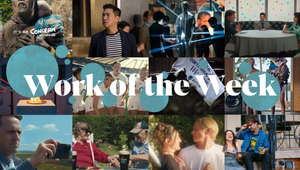
Robot Wars: How to Win at AI

AI is set to bring sweeping changes to the advertising industry – but how are the major players planning to capitalise on this rapidly evolving tech? What’s their strategy and where are they investing time, money and talent? We want to speak to the agencies and tech players to find out about the differing visions for an AI future.
At a panel on Tuesday June 18th at Cannes Lions on the LBB & Friends Beach, leaders from some of the agencies and technology gathered to discuss where we are with AI from a top-down perspective, over 18 months since ChatGPT launched and the world became aware of generative AI.
Featured on the panel was Brian Yamada, chief innovation officer at VML, Jay Ganaden, director, strategic development, Pro Design and Firefly at Adobe, Josh Campo, CEO at Razorfish, Emma Cochrane, North America gen AI lead at Accenture Song, Jamie Allan, director, business development, global agencies and advertising at Nvidia and Jon Williams, global head of agency business development at Amazon Web Services (AWS).
Jay at Adobe set the tone for the panel – the first in a double bill on the beach – by stressing that for the creative industries, we are now at the "implementation stage beyond the hype stage." Generative AI is becoming a normal part of all sorts of workflows at agencies, but he noted that he’s often found himself in meetings with a CCO and general council in the room, because risk management is one of the major factors dictating the speed of gen AI’s uptake in the industry.
At VML, Brian has also witnessed this, as agencies and brands want to jump on AI while it's impacting culture but "lawyers and IT departments have typically kept you on the sidelines."
The creative output from AI is being throttled slightly then. But Josh expressed he’s more excited about "the back of our business" at Razorfish – the inputs and processes that AI is helping to inform, rather than the potentially risky outputs.
Accenture concerns itself with much more than just the marketing of its clients of course, so Emma is overseeing generative AI being applied for customer functions for clients, particularly in strategy functions, where she noted that gen AI is able to provide insights that spark creativity that can take brands in new directions.
"Marketing just got an incredibly large memory," said Jon from AWS. For him, that’s one of the ways in which AI can be put to great use – teaching AI the history of marketing that worked and trying to predict outcomes based on that history.
The panel agreed that the industry is somewhat waiting for the legal side to catch up so that AI feels less risky for brands, but Emma noted that responsible AI is being built into Accenture's approaches in the meantime and "there is a lot of logical sense" that can be applied – simple ways to prepare before the policies are set. That’s part of the thinking behind Accenture Song’s drive for ‘responsible AI’.
Copyright lawsuits are looming and Jay took the opportunity to point out that for Adobe, Firefly was able to construct a model that was more conservative because it was built on images for which the rights are very clear already. He even recounted a scenario where one (unnamed) agency came to Adobe with a somewhat reckless – but very creative – project and had to rework it using Firefly to make it risk free.
One of the biggest macro changes in the past two years has been the growing collaboration between technology and creative businesses on AI. Speaking about this ecosystem, it became clear that everyone on the stage had found ways to work together, with parts of Nvidia, Adobe, AWS all leaning on each other as well as partnerships between them and many major agencies and holding companies.
November 2022 was the moment when years of investment in AI started to make sense to everyone outside of the AI bubble, observed Josh. "Now we're talking about very real things that we can do," he said and thanks to that awakening and the education on AI that it precipitated, he added "our clients are up to speed now."
Educating on AI has been crucial. Razorfish has a curriculum for people, because as Josh stressed, “we can't get myopic around the impact of artificial intelligence. I think it is much broader than YouTube. I would make it much more akin to the combustion engine.”
With that in mind, the way that creative businesses charge for their services based on time was once again called in question on the panel. Brian recognised that for some businesses, charging based on assets will make more sense now. But he underlined the distinction between big transformational ideas and production at scale. Charging models need to respond to what's driving value, he argued, not just what’s being made.
The idea that entry-level roles are being automated away didn’t seem to concern this panel of creative and tech leaders. Josh at Razorfish looked to history and noted the changes we’ve seen several times of what a person in the early part of their career does at work. It will shift entry level roles away from drudgery that nobody values, he suggested. “The value of an agency is actually not that it just can produce assets,” he said. “That's a byproduct. And I think it gets us back to our core business, which is that creativity.”
Finally, the panel considered whether and when artificial general intelligence will arrive to transform our world. Most agreed that it’s too complex to put a timeframe on, but each shared a snippet of the progress that’s bringing us closer.
“The next stage of Nvidia's computing platform is going to be 30 times faster for training language models and over 40 times faster for running these AI models,” said Jamie, who added that the next stage in AI is developing more specialised models that can work together, rather than one large generalist AI model.
It’s coming "faster than you think, more powerful than you think, and the only way to get ready for it is to work out what you want it to do for you and your people," said Emma, who expressed a lot of optimism about AI’s impact on our lives in the next few years.
Josh’s guess for AGI was "inside the five-year mark" thanks to tech partners at Adobe, Nvidia and AWS, he said with a smile of admiration to his fellow panellists. "Now the machine is processing its own pathway to innovation," he said, which makes this is one of those moments of "you embrace or become obsolete."
At Adobe, Jay is interested in stitching different kinds of AI together, like data with generative AI content creation. That, he hopes will actually "pay off on the promise of personalisation that we all made 12 years ago."
We will all have AI agents helping us to shop for us and help us with our lives, said Brian. Which means “we as an industry have to start talking not just about B2B and B2C, but M2M (machine to machine). The same way that we figured out how to break into the algorithms, the same way that we figured out search. I do think it will fundamentally change. But as you know, our industry has to follow our audiences. We have to understand what their adoption patterns are, and then make sure that we are meeting them at those spots or inventing new ways to engage with them in a powerful way. So yeah, I do think it will be transformative.”















